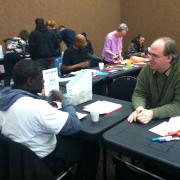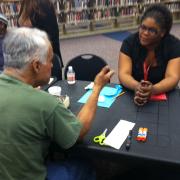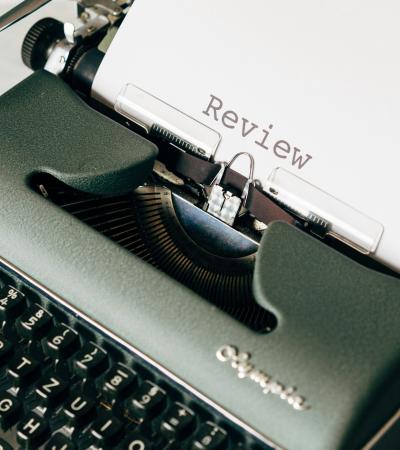Coffee & Conversation is an ongoing community engagement program aimed at providing a space for open dialogue on topics that unite us, rather than divide us. Its focus is engaging the homeless population of Dallas.
Advanced Planning
In September 2013, the Dallas Public Library responded to the city's homeless issue by launching its Homeless Engagement Initiative, which aimed to proactively address the information needs of its homeless customers. The first program of this initiative was Coffee & Conversation, which held its first session in November 2013 and continues on a bi-monthly basis.
We spent two months getting to know customers better and personally inviting them to the first session of the program. Administration and public service staff were involved, as well as the library's AmeriCorps members.
Marketing
We put up fliers on each floor of the library and asked staff to personally invite at least one customer for the first session. After the first session, only flyers and word of mouth were used.
Budgeting
The cost of the program is approximately $50 per month for coffee and cookie supplies.
Day-of-event Activity
We usually have a large coffee pot and individually bag the cookies to help with distribution. Tables and chairs are also set up to encourage conversation and interaction between attendees. We hold the program in an open space of the library for everyone to see, as opposed to a meeting room.
The conversation piece of Coffee & Conversation generally falls into one of three categories: topic, activity and/or guest.
If we have a specific topic, like library policy or to introduce new library staff, then a staff person facilitates the conversation. But we also do free-form conversation, offering suggested topics just to help give customers and staff something to talk about (e.g., favorite movies or why they love the library). We have used topics to help drive program development or promote available services
Activities may include card-making, art, spoken word, poetry, etc. It may start with a staff person introducing the activity and simple instructions, and then people work on the activity while talking about it and whatever else comes to mind. We recently had a baby shower edition (several people involved with the group were pregnant) featuring baby shower décor, games and activities.
Guests have included the VA hospital, City of Dallas Housing, HIV Testing and Girl Scouts. Though information on services is important, we try to limit guest speakers to five minutes and then ask them to stick around for one-on-one conversations as people have questions about resources. We offer one-on-one assistance and service referral through our HELP (Homeless Engagement and Leadership Program) desk, so we use Coffee & Conversation to make customers aware of this service instead of trying to make Coffee & Conversation about social services.
We have also done two activities in one gathering: topic and activity, topic and guest, etc.
Our ultimate goal with Coffee & Conversation is to focus on what people (staff and customers) have in common regardless of their housing status. We seek to provide an opportunity to keep open dialogue with each other and remind each other of our commonalities so the mutual respect bleeds over into how we interact with each other at the library. We do not use it to constantly remind customers they are homeless – focusing too much on service offerings will do this.
Program Execution
We had approximately 25 staff and customers attend the first session, which increased to 80 for the second session. On average we have 35 customers attend each program. The customers really enjoy the program, the conversation and a chance to speak with staff. The program has been a huge success.
Advice
Libraries interested in hosting a Coffee & Conversation program should consider the following:
- Talk to your customers first and get to know their names, then personally invite them to the first program. This should not be required after the program gets started and word of mouth spreads.
- Find the right staff person to lead the program. The staff person should be engaging and usually considered someone "who could talk to anyone" or "the life of the party" in order to keep conversations going and prevent potential awkwardness.
- The program should be set up with coffee and in a comfortable space for people to converse. Conversation is just as integral to the program as the coffee.




